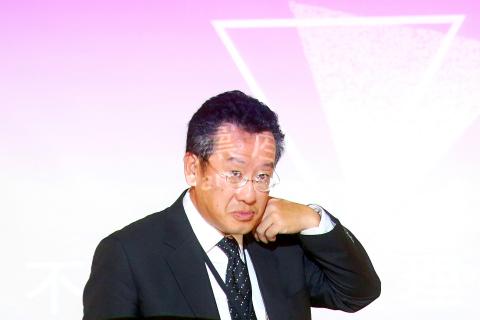The Chinese Nationalist Party’s (KMT) ties with China and its unwillingness to abandon its legacy pose challenges to transitional justice, Ill-gotten Party Assets Settlement Committee Chairman Wellington Koo (顧立雄) said yesterday.
Speaking in Taipei at an event on transitional justice, Koo said the KMT is much stronger than East Germany’s ruling Socialist Unity Party of Germany (SED), to which it is often compared in reference to transitional justice.
Saying that the essence of transitional justice is seeking historical facts, reconciliation and justice, Koo expressed dismay at what he called resistance to such efforts in Taiwan, adding that the pursuits are often misinterpreted as political conflict.

Photo: CNA
Justice must be pursued in a timely fashion to prevent the efforts from losing steam, Koo said.
Comparing the KMT with the SED, Koo said both parties have reacted similarly to investigations into their assets by filing lawsuits at every step, adding that Germany’s party assets investigation committee tirelessly persisted in the face of these obstructions.
“However, Taiwan and Germany have three major differences: Records were dug up immediately following the collapse of East Germany ... but here the records were lost. [In Taiwan] assets were concentrated in the hands of a few following democratization ... [and] the KMT is much more powerful than the SED was,” Koo said.
Koo said the KMT differs from the SED in that it has its own media outlets that voice its position on the issue of unification with China.
Transitional justice measures in post-unification Germany differed greatly in that they did not face the same issues when dealing with the legacy of an authoritarian party, Koo said.
Even after Taiwan transitioned from a nation where protests were violently suppressed, the KMT continued to hold executive, legislative and judicial power, Koo said, adding that obstructions to transitional justice are the natural outcome of that situation.
In that situation “there will never be a judge who says: ‘I completely understand transitional justice,’” Koo said.
He said that the KMT once “sat atop a pedestal,” adding that it can only understand the will of the public when it is on the same level as other parties.
Koo cited the KMT’s previous annual personnel expenses, which were as high as NT$3.2 billion (US$104.4 million), adding that the party’s current staff of 300 is more reasonable for a political party.
Aside from the investigation into its assets, the KMT must face up to its past, Koo said, adding that even the removal of a statue of Chiang Kai-shek (蔣介石) in Tainan was marred with protests.
“However, I believe everything should be fine; we just need to take it one step at a time,” Koo said.

Chinese Nationalist Party (KMT) Chairman Eric Chu (朱立倫), spokeswoman Yang Chih-yu (楊智伃) and Legislator Hsieh Lung-chieh (謝龍介) would be summoned by police for questioning for leading an illegal assembly on Thursday evening last week, Minister of the Interior Liu Shyh-fang (劉世芳) said today. The three KMT officials led an assembly outside the Taipei City Prosecutors’ Office, a restricted area where public assembly is not allowed, protesting the questioning of several KMT staff and searches of KMT headquarters and offices in a recall petition forgery case. Chu, Yang and Hsieh are all suspected of contravening the Assembly and Parade Act (集會遊行法) by holding

PRAISE: Japanese visitor Takashi Kubota said the Taiwanese temple architecture images showcased in the AI Art Gallery were the most impressive displays he saw Taiwan does not have an official pavilion at the World Expo in Osaka, Japan, because of its diplomatic predicament, but the government-backed Tech World pavilion is drawing interest with its unique recreations of works by Taiwanese artists. The pavilion features an artificial intelligence (AI)-based art gallery showcasing works of famous Taiwanese artists from the Japanese colonial period using innovative technologies. Among its main simulated displays are Eastern gouache paintings by Chen Chin (陳進), Lin Yu-shan (林玉山) and Kuo Hsueh-hu (郭雪湖), who were the three young Taiwanese painters selected for the East Asian Painting exhibition in 1927. Gouache is a water-based

Taiwan would welcome the return of Honduras as a diplomatic ally if its next president decides to make such a move, Minister of Foreign Affairs Lin Chia-lung (林佳龍) said yesterday. “Of course, we would welcome Honduras if they want to restore diplomatic ties with Taiwan after their elections,” Lin said at a meeting of the legislature’s Foreign Affairs and National Defense Committee, when asked to comment on statements made by two of the three Honduran presidential candidates during the presidential campaign in the Central American country. Taiwan is paying close attention to the region as a whole in the wake of a

OFF-TARGET: More than 30,000 participants were expected to take part in the Games next month, but only 6,550 foreign and 19,400 Taiwanese athletes have registered Taipei city councilors yesterday blasted the organizers of next month’s World Masters Games over sudden timetable and venue changes, which they said have caused thousands of participants to back out of the international sporting event, among other organizational issues. They also cited visa delays and political interference by China as reasons many foreign athletes are requesting refunds for the event, to be held from May 17 to 30. Jointly organized by the Taipei and New Taipei City governments, the games have been rocked by numerous controversies since preparations began in 2020. Taipei City Councilor Lin Yen-feng (林延鳳) said yesterday that new measures by